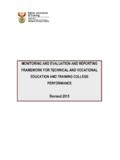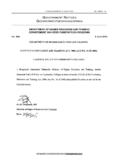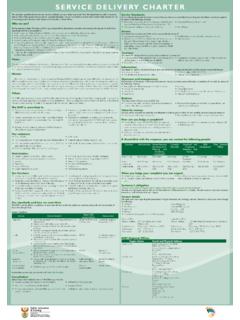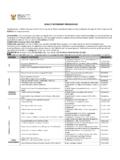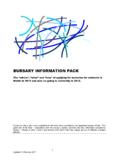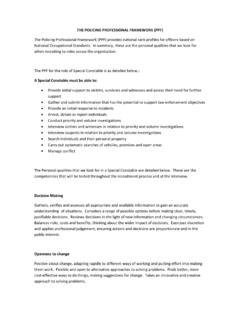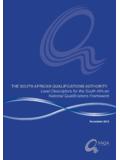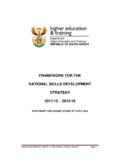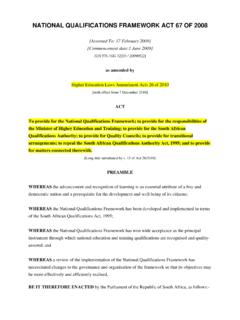Transcription of National Qualifications Framework Act 67 of 2008 - …
1 Government Gazette REPUBLIC OF SOUTH AFRICA Vol. 524 Cape Town 17 February 2009No. 31909 THE PRESIDENCY No. 167 17 February 2009 It is hereby notified that the President has assented to the following Act, which is hereby published for general information: No. 67 of 2008: National Qualifications Framework Act, 2008. AIDS HELPLINE: 0800-123-22 Prevention is the cure ACTTo provide for the National Qualifications Framework ; to provide for theresponsibilities of the Minister of Education and the Minister of Labour; to providefor the South African Qualifications Authority; to provide for Quality Councils; toprovide for transitional arrangements; to repeal the South African QualificationsAuthority Act, 1995; and to provide for matters connected advancement and recognition of learning is an essential attribute of afree and democratic nation and a prerequisite for the development and well-being of itscitizens;WHEREASthe National Qualifications Framework has been developed and imple-mented in terms of the South African Qualifications Act, 1995.
2 WHEREASthe National Qualifications Framework has won wide acceptance as theprincipal instrument through which National education and training Qualifications arerecognised and quality-assured; andWHEREASa review of the implementation of the National Qualifications Frameworkhas necessitated changes to the governance and organisation of the Framework so that itsobjectives may be more effectively and efficiently realised,BE IT THEREFORE ENACTED by the Parliament of the Republic of South Africa,as follows: CHAPTER 1 DEFINITIONS, OBJECT AND APPLICATION OF this Act, unless the context indicates otherwise board means the board of the SAQA established by section 14; Council on Higher Education means the Council established in terms ofsection 4 of the Higher Education Act, 1997 (Act of 1997); education institution means an education institution that is established,declared or registered by law; Gazette meansGovernment Gazette; GENFETQA Act means the General and Further Education and TrainingQuality Assurance Act, 2001 (Act No.)
3 58 of 2001); Higher Education Act means the Higher Education Act, 1997 (Act No. 101 of1997); learning means the acquisition of knowledge, understanding, values, skill,competence or experience;251015 level means a level contemplated in Chapter 2; Minister means the Minister of Education; NQF means the National Qualifications Framework contemplated in Chapter 2; part qualification means an assessed unit of learning that is registered as part ofa qualification ; PFMA means the Public Finance Management Act, 1999 (Act of 1999); professional body means any body of expert practitioners in an occupationalfield, and includes an occupational body; professional designation means a title or status conferred by a professionalbody in recognition of a person s expertise and right to practise in an occupationalfield; qualification means a registered National qualification .
4 Quality council means a Quality Council contemplated in Chapter 5; QC means a quality council; registered means registered on the NQF by SAQA in terms of Chapter 4; relevant Minister means either the Minister or the Minister of Labour asindicated by the context; SAQA means the South African Qualifications Authority contemplated inChapter 4; SAQA Act means the South African Qualifications Authority Act, 1995 (ActNo. 58 of 1995); sector means a sector of education or training, as the case may be, for whosesub- Framework a QC is responsible; Skills Development Act means the Skills Development Act, 1998 (Act No. 97of 1998); skills development provider means a skills development provider contem-plated in section 17 of the Skills Development Act; sub- Framework means a sub- Framework contemplated in Chapter 2; this Act includes the regulations; Umalusi means the council established by section 4 of the GENFETQA of object of this Act is to provide for the further development, organisation andgovernance of the of Act applies to (a) Qualifications offered by (i) education institutions; and(ii) skills development providers; and(b)professional designations,subject to the limitations prescribed in this 2 National Qualifications NQF is a comprehensive system approved by the Minister for theclassification, registration, publication and articulation of quality-assured of NQF5.
5 (1) The objectives of the NQF are to (a)create a single integrated National Framework for learning achievements;(b)facilitate access to, and mobility and progression within, education, trainingand career paths;(c)enhance the quality of education and training;(d)accelerate the redress of past unfair discrimination in education, training andemployment opportunities.(2) The objectives of the NQF are designed to contribute to the full personaldevelopment of each learner and the social and economic development of the nation atlarge.(3) SAQA and the QCs must seek to achieve the objectives of the NQF by (a)developing, fostering and maintaining an integrated and transparent nationalframework for the recognition of learning achievements;(b)ensuring that South African Qualifications meet appropriate criteria, deter-mined by the Minister as contemplated in section 8, and are internationallycomparable; and(c)ensuring that South African Qualifications are of an acceptable levels6.
6 (1) The NQF is organised as a series of levels of learning achievement, arranged inascending order from one to ten.(2) Each level on the NQF is described by a statement of learning achievement knownas a level descriptor.(3) A level descriptor, referred to in subsection (2), provides a broad indication oflearning achievements or outcomes that are appropriate to a qualification at that level.(4) Level descriptors must be developed and determined, as provided for in section13(1)(g).(5) There is one set of level descriptors for the NQF is a single integrated system which comprises of three co-ordinatedqualifications sub-frameworks, for (a)General and Further Education and Training, contemplated in theGENFETQA Act;(b)Higher Education, contemplated in the Higher Education Act; and(c)Trades and Occupations, contemplated in the Skills Development 3 RESPONSIBILITIES OF MINISTERSR esponsibilities of Minister8.
7 (1) The Minister has the overall executive responsibility for the (a)NQF;(b)SAQA; and(c)QC for General and Further Education and Training and the QC for HigherEducation contemplated in Chapter 5.(2) The Minister must (a)consider advice from SAQA or a QC in terms of this Act;(b)determine policy on NQF matters in terms of this Act, after consultation withthe Minister of Labour, and publish the policy in theGazette;(c)after consultation with the Minister of Labour, publish guidelines which setout the government s strategy and priorities for the NQF, and which may beupdated annually;65101520253035404550(d)provide funds from money appropriated by Parliament for SAQA to enable itto fulfil its functions in terms of this Act;(e)determine, after considering advice from the SAQA and after consultationwith the Minister of Labour, the sub-frameworks contemplated in section 7(a)and(b), respectively, and publish them in theGazette.
8 And(f)determine by regulation in theGazette, after consultation with the Minister ofLabour, the process by which a dispute involving the SAQA or a QC must beresolved, and any matter relating thereto.(3) The Minister, after consultation with the Minister of Labour, must (a)advance the achievement of the objectives of the NQF contemplated inChapter 2;(b)uphold the coherence and public credibility of the NQF;(c)encourage collaboration among the QCs and between the QCs and SAQA.(4) The Minister may perform any other function consistent with this of Minister of Minister of Labour (a)has the executive responsibility for the QC for Trades and Occupationsestablished by the Skills Development Act;(b)must consider advice on NQF matters from the SAQA or a QC in terms of thisAct;(c)must, after considering advice from the SAQA and after consultation with theMinister, determine the sub- Framework contemplated in section 7(c)andpublish it in theGazette.
9 And(d)may perform any other function consistent with this Act that advances theobjectives of the NQF contemplated in Chapter 4 SOUTH AFRICAN Qualifications AUTHORITYC ontinued existence of SAQA that existed immediately before the commencement of this Act,continues to exist as a juristic person under the name of the South African of objects of the SAQA are to (a)advance the objectives of the NQF contemplated in Chapter 2;(b)oversee the further development and implementation of the NQF; and(c)co-ordinate the of SAQA is accountable to the of SAQA13.(1) The SAQA must, in order to advance the objectives of the NQF (a)(i) perform its functions subject to this Act; and(ii) oversee the implementation of the NQF and ensure the achievementof its objectives;(b)advise the Minister and the Minister of Labour on NQF matters in terms ofthis Act;(c)comply with policy determined by the Minister in terms of section 8(2)(b);(d)consider the Minister s guidelines contemplated in section 8(2)(c);(e)oversee the implementation of the NQF in accordance with an implementationframework prepared by the SAQA after consultation with the QCs.
10 (f)(i) develop a system of collaboration to guide the mutual relations ofthe SAQA and the QCs, after consultation with the QCs and taking85101520253035404550into account the objects of the SAQA contemplated in section 11and the regulations contemplated in section 33; and(ii) resolve disputes regarding the QCs;(g)with respect to levels (i) develop the content of level descriptors for each level of the NQFand reach agreement on the content with the QCs;(ii) publish the agreed level descriptors in theGazette; and(iii) ensure that they remain current and appropriate;(h)with respect to Qualifications (i) develop and implement policy and criteria, after consultation withthe QCs, for the development, registration and publication ofqualifications and part- Qualifications , which must include thefollowing requirements:(aa)The relevant sub- Framework must be identified on anydocument relating to the registration and publication of aqualification or part- qualification ; and(bb)each sub- Framework must have a distinct nomenclature for itsqualification types which is appropriate to the relevantsub- Framework and consistent with international practice;(ii) register a qualification or part- qualification recommended by a QCif it meets the relevant criteria.
